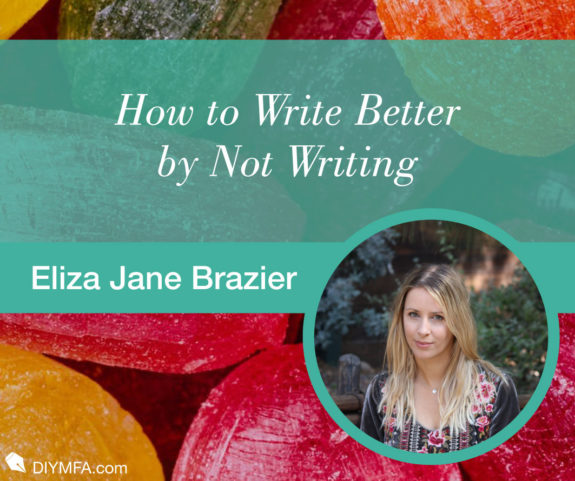The summer after my first book deal, I really struggled with inspiration. I did not struggle with word count. I wrote something like six novels that summer but my then-agent rejected every single one. My books just weren’t resonating, so I decided to try a new approach. A friend of mine recommended The Artist’s Way by Julia Cameron. Desperate, I decided to try it. The book asks questions and offers exercises meant to help you tap into your creative self. I tried to consider the questions honestly. The answers surprised me. This book I had bought to make me a better writer seemed to be telling me to stop writing.
I didn’t even finish the book before I embarked on another “Way”—the Santiago Trail in Spain, which I walked with my parents. The Santiago Trail is meant to be a spiritual pilgrimage, and again I felt that I needed to draw a line in the sand and move away from writing.
After I reached Santiago, I parted ways with my agent and stopped pursuing writing as a career. I moved back to America (I had been living in London for a decade). I started working with horses again and eventually moved to Los Angeles, which became the inspiration for my recently released novel, Good Rich People.
For nearly two years I hardly wrote a thing and it was just what I needed to start writing again. I am certainly not advocating for such a long break—although I personally needed it—but I do think that problems with writing and inspiration are rarely about writing itself.
Here are some exercises to help you become a better writer by not writing:
Reconnect with your childhood self
Part of my problem was that I had lost sight of my identity. I had been recently widowed after a seven-year relationship that was largely focused on survival and my husband’s career. By reconnecting with the things I loved as a child—horses and Los Angeles—I was able to find meaningful inspiration.
Think about what you wanted to be before you learned whether you could be or not. What were your passions? What made you laugh? Often these things can feel so distant. I’m not that person anymore, you might think, but that person is still buried inside you and often they hold the keys to your true creative self.
Once you uncover those latent interests, explore them. Is there a way you can meet an astronaut, explore a fire station, visit a zoo? If it makes you feel silly, it may be because it means more to you than you’re willing to accept.
Disconnect from your phone
I’m convinced that the Internet is one of the biggest killers of creativity. But I need to stay tapped into current trends and culture, you say. A bunch of random Instagram accounts might hold the key to my next idea! But the truth is, the Internet is built on artificial reality and while it may inspire superficial ideas, it is unlikely to inspire anything meaningful enough to be worth your time.
It’s unrealistic to say that you should disconnect completely but I highly recommend giving yourself off days or large blocks of time where you plan to stay off the Internet—and planning ahead is mega important, so you are not forced back on by something you “need” to do.
Note that this is not writing time, this is time to be in the moment, whatever that is. Whether you are with your kids, waiting in line, lying in bed, use this time to let your creative mind flow. Remember what it was like to actually be bored—this is why stories were invented!
Tackle a challenge that will take a long time to complete
It can be anything—set a goal to run a marathon, start a garden—but it has to be something that will take weeks or months to complete. The idea is to teach yourself discipline and perseverance.
Whenever I speak to people unfamiliar with the publication process, I find that they have no concept of the actual time it takes not only to complete a novel but to find representation, a publisher, to go through editing, and finally, see a book through to release.
Most of my author friends did not have their first story published. In fact, most did not have their tenth story published. Whether you are just starting out or an old hat, one of the hardest things to remember is that writing a novel takes time. The people who finish are the ones who understand that there will be long periods where it feels like nothing is being achieved, like you are just making a mess and getting nowhere, and push through anyway.
Nearly any great accomplishment in life is done in the same way, and it’s important to remind yourself of this and teach yourself to see something through to the end.
Go Method
This is one for the truly bold, the method writers! Take a day or even an hour, a hike in the woods, or a trip to the store in character. Choose places where you won’t have to speak to or interact with people, this exercise is about getting into your imagination, not provoking an external reaction! But feel free to dress how the character would dress, even go to a place that the character would go. While you are there, think through the character’s backstory and life up until “now.” Imagine conversations between the character and friends or family that would not appear in any book, scenes without plot or conflict. Get to know your character as a person.
Creativity often functions better when free from the pressures of story structure. Sometimes we put too much pressure on ourselves to put a character to work and we forget to get to know them first. The most enjoyable stories to write are ones about characters we love.
Read
This one seems obvious, but it’s easy to forget. Read, and do it in a variety of ways. Sometimes read for pleasure. Read the books that you want to read, not the books you think you should read or the ones in your genre. Other times, do the opposite. Read in a targeted way, focusing on popular books in your genre or field of interest, with an eye toward examining what they do well and how you can add to the conversation.
Sometimes when we are blocked, reading can feel as hard as writing. The key, in this and all of the above, is to make sure we are letting our passion lead.
It is so easy to get so caught up in writing goals that we lose all inspiration. By tapping into our true creative selves, we can not only write better but we can write more meaningfully. We can write the books that change our lives.
Tell us in the comments: How are you productively not writing?

Eliza Jane Brazier is an author, screenwriter, and journalist. She currently lives in California, where she is developing her books for television. You can find her on Facebook, or follow her on Instagram and Twitter.







